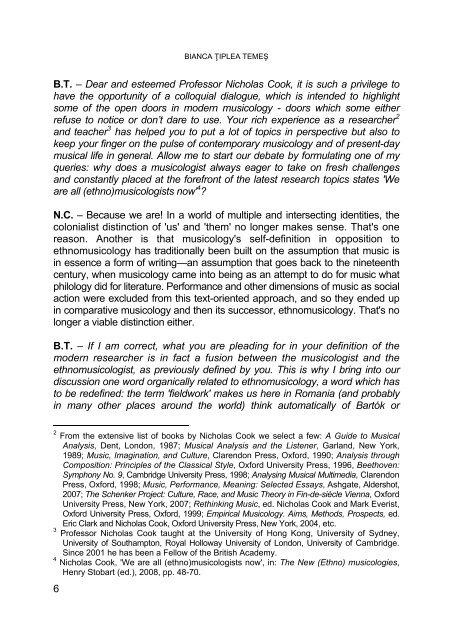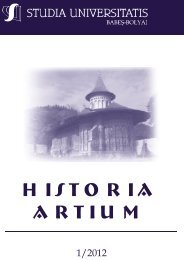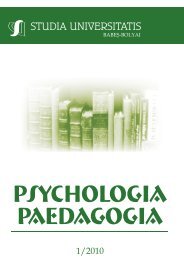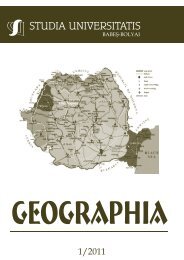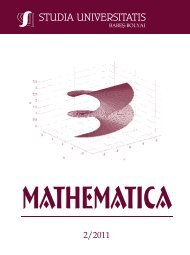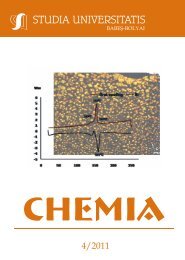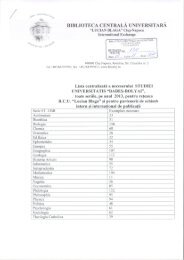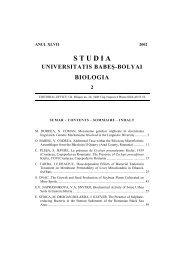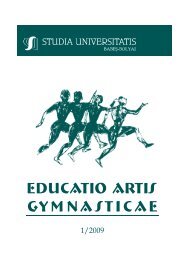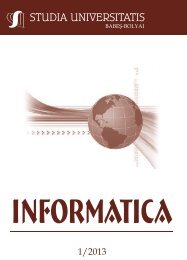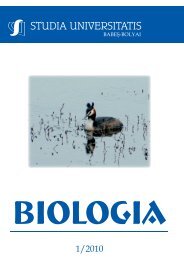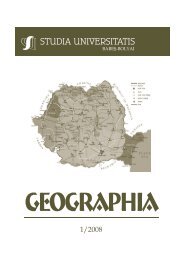musica - Studia
musica - Studia
musica - Studia
Create successful ePaper yourself
Turn your PDF publications into a flip-book with our unique Google optimized e-Paper software.
BIANCA ŢIPLEA TEMEŞ<br />
B.T. – Dear and esteemed Professor Nicholas Cook, it is such a privilege to<br />
have the opportunity of a colloquial dialogue, which is intended to highlight<br />
some of the open doors in modern musicology - doors which some either<br />
refuse to notice or don’t dare to use. Your rich experience as a researcher 2<br />
and teacher 3 has helped you to put a lot of topics in perspective but also to<br />
keep your finger on the pulse of contemporary musicology and of present-day<br />
<strong>musica</strong>l life in general. Allow me to start our debate by formulating one of my<br />
queries: why does a musicologist always eager to take on fresh challenges<br />
and constantly placed at the forefront of the latest research topics states 'We<br />
are all (ethno)musicologists now' 4 ?<br />
N.C. – Because we are! In a world of multiple and intersecting identities, the<br />
colonialist distinction of 'us' and 'them' no longer makes sense. That's one<br />
reason. Another is that musicology's self-definition in opposition to<br />
ethnomusicology has traditionally been built on the assumption that music is<br />
in essence a form of writing—an assumption that goes back to the nineteenth<br />
century, when musicology came into being as an attempt to do for music what<br />
philology did for literature. Performance and other dimensions of music as social<br />
action were excluded from this text-oriented approach, and so they ended up<br />
in comparative musicology and then its successor, ethnomusicology. That's no<br />
longer a viable distinction either.<br />
B.T. – If I am correct, what you are pleading for in your definition of the<br />
modern researcher is in fact a fusion between the musicologist and the<br />
ethnomusicologist, as previously defined by you. This is why I bring into our<br />
discussion one word organically related to ethnomusicology, a word which has<br />
to be redefined: the term 'fieldwork' makes us here in Romania (and probably<br />
in many other places around the world) think automatically of Bartók or<br />
2 From the extensive list of books by Nicholas Cook we select a few: A Guide to Musical<br />
Analysis, Dent, London, 1987; Musical Analysis and the Listener, Garland, New York,<br />
1989; Music, Imagination, and Culture, Clarendon Press, Oxford, 1990; Analysis through<br />
Composition: Principles of the Classical Style, Oxford University Press, 1996, Beethoven:<br />
Symphony No. 9, Cambridge University Press, 1998; Analysing Musical Multimedia, Clarendon<br />
Press, Oxford, 1998; Music, Performance, Meaning: Selected Essays, Ashgate, Aldershot,<br />
2007; The Schenker Project: Culture, Race, and Music Theory in Fin-de-siècle Vienna, Oxford<br />
University Press, New York, 2007; Rethinking Music, ed. Nicholas Cook and Mark Everist,<br />
Oxford University Press, Oxford, 1999; Empirical Musicology. Aims, Methods, Prospects, ed.<br />
Eric Clark and Nicholas Cook, Oxford University Press, New York, 2004, etc.<br />
3 Professor Nicholas Cook taught at the University of Hong Kong, University of Sydney,<br />
University of Southampton, Royal Holloway University of London, University of Cambridge.<br />
Since 2001 he has been a Fellow of the British Academy.<br />
4 Nicholas Cook, 'We are all (ethno)musicologists now', in: The New (Ethno) musicologies,<br />
Henry Stobart (ed.), 2008, pp. 48-70.<br />
6


